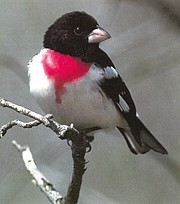Antics of resident and migratory birds overcome postal woes
Once in a while something so adorable happens that one simply must share it. My sharing today will probably not be news to a lot of people more savvy than me, but all the same, here it is.
I was sitting on my shaded deck the other day, watching the antics of an assortment of Chickadees – Mountain, Black-capped and Chestnut-backed – flitting between the seed feeders, suet blocks and birdbath, reveling in their cuteness and delighted that they accepted my presence without fear – even pecking around the porch floor and on the table where I sat.
I noted the three species, and smiled at the little “thieve’s masks” which the Mountain chickadees wear. About that time, daughter Diane brought my mail, which included a copy of the new Birds and Blooms magazine and later, perusing it, saw an article on those very birds. And just guess what a flock of Mountain Chickadees is called? A “Banditry”! How cute is that?
Probably a lot of you were already aware of this nomenclature (I’ll bet my favorite “bird-guy” Mike Turnlund knew) but I – who took two years of Ornithology in college – had never heard it. Of course, that was nearly 70 years ago so the flock names of different species may well be ancient history.
Anyhow, it’s a day-brightener, and we can all use some of those! Along those lines, I have become the recipient of a veritable avalanche of mail that is (unfortunately) adding to the paper pile at the recycling center.
I have for several years contributed modest donations to my personal choice of four environmental causes. But recently, somewhere someone hit a wrong key and two things happened: I began getting packets of identical info from one of the groups – addressed to Vallie, Valee. Valey. and best of all – MR. Valle Novak! Soon, a whole new world of worthy causes got these new names and I have been getting at least 20 packets a week from old and new entities – which often include gift cards, stamps (name and/or ornamental), and even calendars. I have a plethora of wrong-name stamps and lovely calendars from groups I’ve never heard of, thanking me for my (hoped-for) contribution. Every park , forest, ocean, lake, desert, mountain, national and foreign – including heart-breaking animal abuse fighters of every species in the world – is represented in the mix, and they are all depending on this new 90 year-old, just short of poverty, “best friend” to save them!
I know that if I had Internet, I could somehow let them know of their mistake, but though I have sent some back and tried to call some of them (no one uses phones anymore except me, I guess) it’s a losing proposition. I’ll donate the calendars, book-marks, cards and such to the Senior Center and/or rest homes and recycle the rest.
Returning now, to the happier subject of birds, the afore-mentioned Chickadees keep pretty much to themselves, as do most of the bird population here. They associate amicably with the red=breasted and white=breasted Nuthatches at the feeding stations, but keep to themselves at the birdbath – save for one exception: In early evening I often set the sprinkler to cover the large bath dish and shrubby surroundings for a free-for-all of every bird on the place! Sparrows, Spotted and/or Rufous-sided Towhees, Siskins, Grosbeaks, Robins, Kinglets and various Finches all swoop and soar through the falling water – some “bathe” in the sprinkles on a branch, others revel in the dish itself, either in the deeper water or on the edges – fluttering, preening and just generally having a joyous time. A bevy of various hummingbirds zip through it all, and only the woodpeckers eschew the bathing. They drink from the dish from time to time, but don’t in any way associate with the songbirds. Various woodpeckers at the suet blocks include most commonly Hairy, Downy, Piliated (yes, the BIG dude!), Red-headed, Red-naped Sapsucker, and rarely, a Ladderback, as well as the related jays – Stellar and an occasional California (Blue), and Red- or yellow-shafted Flickers.
I recently received a call from Jana Shields, who lives in the Bottle Bay area, and reported her very welcome news of Cedar Waxwing sightings in the area. They’ve been rare here, too, for the past two or three years. In the past, they would fly in with the Grosbeaks and while not numerous, maintained a comforting presence with their elegant grace. My Mountain Ash tree is covered with orange berry clusters this season, so maybe that will draw some.
Bird-habitat maintenance is such a rewarding undertaking. I am lucky to have lots of tree cover and native shrubbery to augment my “gone wild” jungle of bush and floral growth that welcomes them as well as the beleaguered bees, butterflies, dragonflies and pollinators of every ilk (remember, those funny-looking little ant-like bees in your flowers are pollinators, too)! Toss the insecticides, herbicides and fungicides and let Mom Nature be the guide.
There’s too much poison in the world – not just of gardens, but of minds, attitudes, and activities. I’ve always said that Love is the answer to everything, and when birds, bees, gardens and forests are the recipients, it’s totally a Win-Win situation! (Of course, first of all, Love One Another – and that’s not my quote)!
Valle Novak writes the Country Chef and Weekend Gardener columns for the Daily Bee. She can be reached at bcdailybee@bonnercountydailybee.com. or by phone at 208-265-4688 between the hours of 8 a.m. to 7 p.m.





